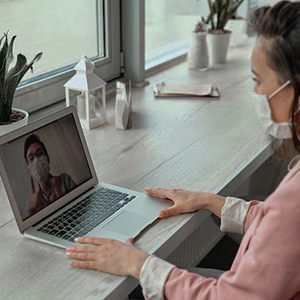The transition to online psychotherapy during the pandemic: a qualitative study on patients’ perspectives

All claims expressed in this article are solely those of the authors and do not necessarily represent those of their affiliated organizations, or those of the publisher, the editors and the reviewers. Any product that may be evaluated in this article or claim that may be made by its manufacturer is not guaranteed or endorsed by the publisher.
Accepted: 19 September 2022
Authors
The coronavirus disease 2019 (COVID-19) pandemic has substantially increased online psychotherapies due to the impossibility of participating in vis-a-vis settings. In the last years, research about online therapy has been quickly growing. However, until now, few studies investigated patients’ perspective about the transition to online psychotherapy and, specifically, no qualitative research in group therapy has been done on this topic. This study aimed to explore the experience of 51 patients (39 group patients and 12 from individual psychotherapies) who continued psychotherapy in the online setting during the COVID-19 outbreak. A structured online questionnaire with open answers investigated the following topics: setting online, effectiveness, psychotherapy relationship, specific dynamics of online psychotherapy. Patients’ answers were analysed by means of Consensual Qualitative Research, modified version (CQRM), an inductive method that allows analysing a large sample and relatively brief written answers. The results show the impact of shift to online platforms on patients and explore how easy or difficult it is for them to adapt to therapeutic processes are in online therapy (vs in-person therapy), by highlighting potential barriers and resources to practice implementation. Participants’ responses have been arranged into three main domains: setting online, content/effectiveness of online therapy and therapeutic relationship. A fourth domain, specific for online group therapy, collected responses referred to the changes perceived regarding the group dynamics. From the patient’s perspective, online therapy is effective and satisfying. Patients perceived a positive quality of therapeutic relationship in online setting, whereas produced more controversial judgments concerned the changes due to the online setting. Finally, patients in group therapy gave more attention and importance in showing and seeing private personal spaces than the ones in individual therapy.
How to Cite

This work is licensed under a Creative Commons Attribution-NonCommercial 4.0 International License.






